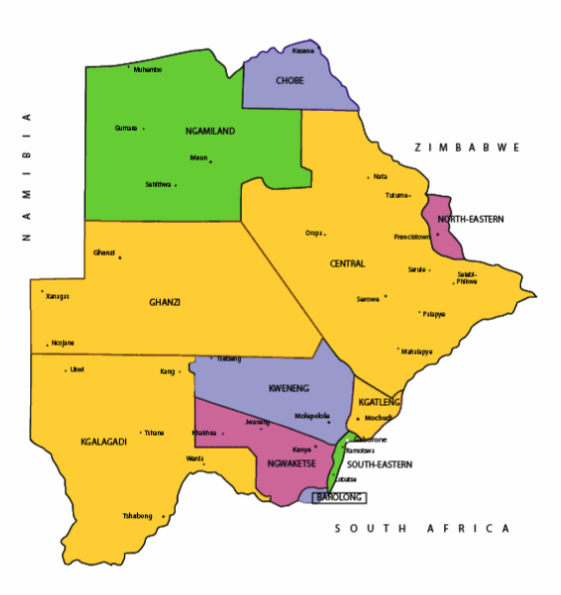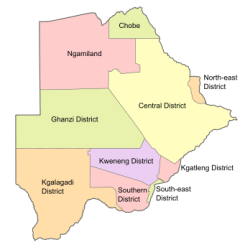Places and their polling stations in Ramotswa, Botswana
301 Sepitswana
1401 Baitlotli JSS
1402 Twelve Apostle Church
1403 Morokologadi Kgotla
1404 Seboko Primary School
1405 St. Paul Church
302 Magopane
1406 Ramotswa JSS
1407 Kagiso SSS
1408 Assemblies of God
1409 Ketshwerebothata Primary School
1410 Tent At Standpipe
303 Taung
1411 Metsimaswaane Health Post
1412 Taung JSS
1413 St. Bernard’s Primary School
1414 Ramotswa Roads Day Care
304 Mogobane
1415 Mojadife Primary School
1416 Community Hall
1417 Mogobane Primary School
1418 Full Gospel Church
1419 Assemblies of God
1420 Veterinary Department
305 Otse South
1421 Baratani JSS
1422 Tlamelo Day Care Centre
1423 Otse Primary School
1424 Twelve Apostle Church
1425 Lesetlhana Mobile Clinic
306 Otse North
1426 Baratani Primary School
1427 Otse Police College
1428 Ratauyagae Health Post
1429 Sakutswane Health Post
1430 Moeding College
307 Mothubakwane
1431 Siga Clinic
1432 Siga Primary School
1433 Lesetlheng Health Post
1434 Ga Mmadira Kgotla
308 Kelemogile
1435 Kelemogile JSS
1436 Tent Opposite Dingaka Association
1437 Faith Mission
1438 Goo Kobua VDC
1439 Kgetheng Primary School
309 Kgosing
1440 Main Kgotla
1441 Goo Mankga Kgotla
1442 Mokgosi Primary School
1443 Ga Siko Kgotla
310 Makolobotho
1444 Goo Ntswa VDC
1445 Nazareth Church
1446 Old Kgosing Kgotla
1447 Goo Moeng Kgotla
311 Lesetlhana
1448 St. Conrad’s Primary School
1449 Tlokweng Kgotla
1450 Lesetlhana Primary School
1451 A Tent Near A Flat Adjacent To Monate Tuckshop
Reference: iec.gov.bw/index.php/electoral-districts/polling-stations.html
Botswana
Botswana is a country in Africa. It is topographically flat, with approximately 70 percent of its territory being the Kalahari Desert.
It is bordered by South Africa to the south and southeast, Namibia to the west and north, and Zimbabwe to the northeast.
Capital: Gaborone
Currency: Botswanan Pula
Official language: English
Population: 2.588 million (2021) World Bank
Dialing code: +267
Gross Domestic Product: 17.61 billion USD (2021) World Bank
Botswana’s ten districts are:
- Southern District
- South-East District
- Kweneng District
- Kgatleng District
- Central District
- North-East District
- Ngamiland District
- Kgalagadi District
- Chobe District
- Ghanzi District
Botswana’s councils created from urban or town councils are: Gaborone City, Francistown, Lobatse Town, Selebi-Phikwe Town, Jwaneng Town, Orapa Town and Sowa Township.






The name Botswana refers to ‘Land of the Tswana’. The landlocked, Southern Africa country is officially known as the Republic of Botswana.














Botswana is connected to Zambia through the Kazungula Bridge making it the world’s shortest border between two countries.
A country of slightly over 2 million people (2021), Botswana is one of the most sparsely populated countries in the world. It is essentially the nation state of the Tswana ethnic group, who make up 79% of the population.

About 11.6 per cent of the population lives in the capital and largest city, Gaborone.
Formerly one of the world’s poorest countries—with a GDP per capita of about US$70 per year in the late 1960s—it has since transformed itself into an upper-middle-income country, with one of the world’s fastest-growing economies.


The Tswana ethnic group were descended mainly from Bantu-speaking tribes who migrated southward of Africa to modern Botswana, living in tribal enclaves as farmers and herders.




In 1885, the British colonised the area and declared a protectorate under the name of Bechuanaland.
As colonisation stopped, Bechuanaland became an independent republic under its current name on 30 September 1966.


Since then, it has been a representative republic, with a consistent record of uninterrupted democratic elections and the lowest perceived corruption ranking in Africa since at least 1998.

The economy is dominated by mining and tourism. Botswana has a GDP (purchasing power parity) per capita of about $18,113 as of 2021, one of the highest in subsaharan Africa.


Botswana is the world’s biggest diamond producing country.
Its relatively high gross national income per capita gives the country a high standard of living and the third-highest Human Development Index of continental Sub-Saharan Africa (after Gabon and South Africa).
The country has been adversely affected by the HIV/AIDS epidemic. In 2002, Botswana began offering anti-retroviral drugs (ARVs) to help combat the epidemic.
Botswana is a member of the Southern African Customs Union, the Southern African Development Community, the Commonwealth of Nations, and the United Nations.

